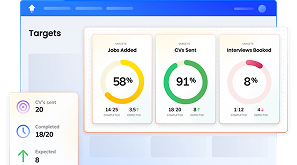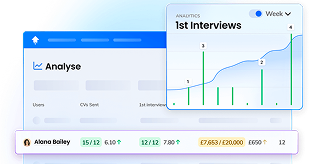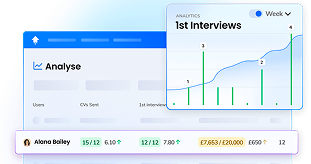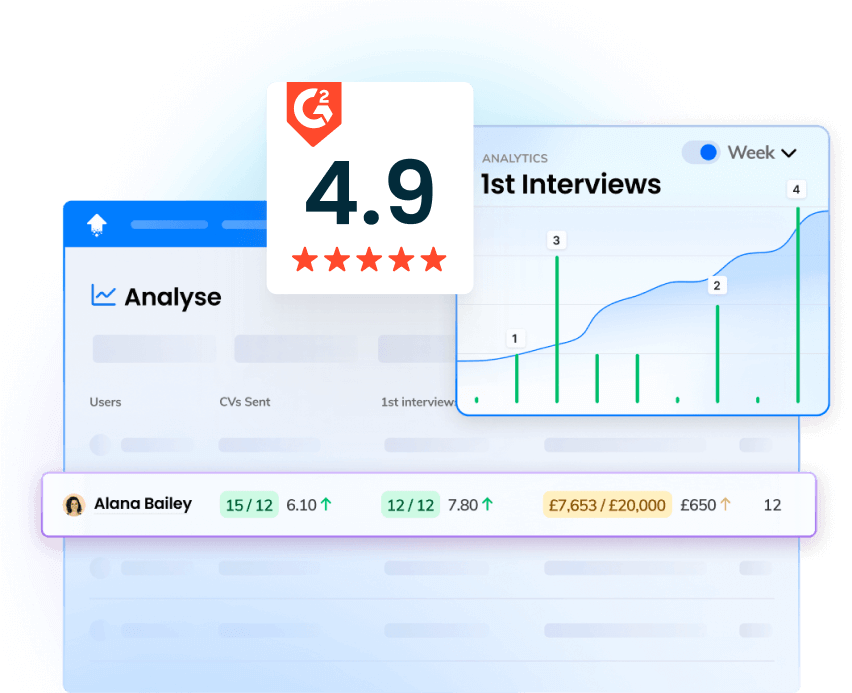Recruitment assessments are a crucial part of the hiring process in 2024.
These tools provide agencies with a data-driven approach to evaluating candidates' skills, personality, and potential.
This ensures a more objective and accurate selection process that reduces bias and ultimately results in higher-quality hires.
As every recruiter knows, the job market is becoming increasingly competitive. These assessments streamline recruitment, enhance decision-making, and boost employee retention by aligning candidates' strengths with job requirements.
Put simply, advanced recruitment assessment tools are crucial if you want to effectively recruit in 2024.
In this in-depth guide, we'll discuss the different tests you may find helpful and some of the most beneficial recruiting assessment tools to deploy.
What is a Recruitment Assessment?
Historically, the hiring process went a little something like this:
- Receive CV
- Send application
- Set up interview
Sure, larger organisations may have added an extra step in the form of a written exam or quiz — but in-depth assessments were generally eschewed.
This approach was challenging, however.
After all, just because someone has the qualifications required for a role doesn't mean they have all the skills and capabilities needed to excel.
And just because a candidate comes across as highly likeable in the interview doesn't mean they'll deliver ROI.
Recruitment assessments solve these challenges by identifying which candidates should be moved to the next stage of the recruitment funnel.
At their core, they are simply a structured and targeted approach to evaluating potential candidates.
These assessments employ various tools—from psychometric tests and role-playing exercises to job simulations and skills-based video games—to gauge a candidate's skills, behaviours, and cultural fit.
Using the data from these assessments, recruiters can then build a comprehensive picture of each candidate's suitability for the role and organisation.
They can also use previous candidates' assessment results to help them build a picture of the perfect hire for that role and organisation.
For example, you may notice that successful candidates who score extremely high on 'people skills' are the hires who go on to thrive in a particular role, while more analytical individuals struggle.
When recruiting for that role, this tells you you're looking for candidates with solid people skills.
6 Benefits of Using Recruitment Assessments for Agencies
Using recruitment assessments will help you deliver a better overall service to your clients, but here is a breakdown of six of the specific benefits you can expect.
#1 Improved Candidate Quality
When you've only got a CV and an hour-long interview to go off, it's easy to make the wrong decision.
After all, CVs are often embellished, and interviews are not always indicative of future performance.
Using recruitment assessments is like having a good look under the bonnet before buying a car—rather than just trusting what the salesperson says.
You can track the performance metrics that are most important to you to learn more about a candidate's skills, personality, and cultural fit.
This thorough evaluation empowers you to make data-backed decisions on which candidates to move to the interview stage, significantly improving candidate quality and delighting your clients.
#2 Reduced Time-to-Hire
Moreover, recruitment assessments are a real time-saver in the hiring process.
By using targeted tools to evaluate candidates' skills and fit, you can quickly narrow down your pool to the most promising prospects.
This means less time sifting through CVs and conducting endless interviews and a significantly reduced Time-to-Hire.
Instead, you swiftly get a clear picture of top candidates, allowing for quicker, more informed decisions.
Read more: How to Measure Recruitment Effectiveness
#3 Enhanced Candidate Experience
In the highly competitive jobs market of 2024, it's crucial that recruitment agencies strive to delight candidates — as well as clients.
This will lead to a positive agency reputation and help you to bring in top talent for your customers.
And recruitment assessments can make the job hunt more engaging for candidates.
First, these assessments are structured and transparent processes with clear goals and milestones, streamlining the candidate experience.
They offer a chance to showcase skills beyond the CV, giving a fuller picture of what they can bring to the table, while gamified assessments add some much-needed fun to the hiring process.
It's fairer, too, as everyone's measured on the same criteria.
Plus, investing in comprehensive recruitment assessments means candidates know the business really cares about who they hire for this role, suggesting the successful hire will be valued once in post.
#4 Better Cultural Fit
Recruitment assessments are brilliant for finding candidates who align with the organisation's culture and values and will gel with your team.
How?
These tests don't just focus on a candidate's qualifications, experience or skills.
They delve into a person's values, work style, and personality, helping you spot those who'll thrive in your company culture.
As all recruiters know, identifying the perfect match isn't just about hard skills.
It's about finding someone who'll fit right in, boosting employee morale, productivity, and retention.
#5 Increased Hiring Accuracy
Recruitment assessments are a bit like a safety net for hiring.
They provide solid, objective data on each candidate's abilities rather than relying solely on gut feeling or impressive interviews.
This approach helps you spot potential issues early on, reducing the risk of bringing someone on board who might not be up to scratch.
After all, bad hiring decisions are costly for both clients and agencies.
In addition to losing out on commission, recruitment agencies will likely lose loyal clients if they continue to deliver low-quality candidates.
It's all about making more informed decisions.
#6 Improved Retention
Most businesses want to keep their employees long-term.
Not only is this more cost effective, but it boosts productivity, team cohesion, and customer relationships — and ensures they see ROI on training and personal development initiatives.
And by ensuring a good match between the candidate and the role from the start through recruitment assessments, you're more likely to hire motivated, productive employees who stick around.
After all, happy employees tend to stay put!
7 Key Types of Recruitment Assessments
So, we know recruitment assessments are vital to agency success.
But what types of recruitment assessments are most effective, and what do they involve?
Here are seven of the most popular.
#1 Interviews
The good old interview may have some drawbacks, but it remains a crucial recruitment assessment.
After all, interviews are vital for understanding who a candidate is and how strong their people skills are.
But in 2024, you don't have to stick only to in-person interviews.
Phone and video interviews can also be used earlier in the hiring process to assess communication skills and cultural fit.
What's more, AI-powered video platforms now allow for one-way interviews with customised prompts that recruiters can review at their leisure.
#2 Psychometric Tests
Psychometric tests are used to evaluate personality traits, cognitive abilities, and work styles during the hiring process.
They give you a glimpse into the candidate's mind, measuring personality traits, cognitive abilities, and work preferences.
Specifically, psychometric tests can ensure that the candidate possesses the skill and cognitive ability needed to perform well in the role.
Typically, this involves testing numerical skills as well as verbal and non-verbal reasoning skills.
But recruiters also use them to get a more rounded view of potential hires, helping to match the right person to the right role.
#3 Role-playing Exercises
Simulate real job scenarios to get a more realistic idea of how a candidate will perform.
These exercises typically assess problem-solving and interpersonal skills.
They can be conducted in-person or online through gamification and job simulation software.
#4 Technical Skills Assessments
Testing specific technical skills and knowledge relevant to the job role is vital.
The type of technical test you need will vary depending on the organisation and the role.
For example, if you're hiring for a web developer position, you may want to set them a timed coding challenge.
However, a written question-and-answer examination may be more appropriate for a nursing role.
#5 Cognitive Ability Tests
With cognitive ability tests, recruiters aim to measure overall mental capability, problem-solving and logical reasoning.
Depending on the role, cognitive ability tests may incorporate:
- Numerical reasoning tests
- Verbal reasoning tests
- Abstract reasoning tests
- Spatial reasoning tests
- Problem-solving tests
- Memory tests
- Critical thinking tests
These assessments can be given in a simple question-and-answer format or gamified online for higher engagement levels.
#6 Job Knowledge Tests
A job knowledge test requires input from the client.
This assesses a candidate's understanding of the job itself, their knowledge of key subjects vital to the role, and relevant industry knowledge.
The format these tests take will depend on the industry, organisation, and role.
For instance, a candidate for a C-suite position in a business may be asked to put together a presentation on a core subject related to the role, while a candidate for a construction job may be asked to demonstrate how they would complete a task.
#7 Emotional Intelligence Tests
The importance of emotional intelligence in the workplace must not be underestimated.
Emotional intelligence tests assess a candidate's ability to understand and manage their own and others' emotions.
During an emotional intelligence test, candidates are often asked to respond to specific situations or statements and then help you to understand their responses.
Emotional intelligence tests are often baked into role-playing exercises, interviews, psychometric testing, and cognitive ability assessments.
15 Most Useful Tools for Agencies to Do Recruitment Assessments
Ready to elevate your recruitment assessment game?
Check out these 15 effective tools.
#1 WeCP
A market-leading skill assessment platform, WeCP is perfect for recruiters hiring technical talent.
It encompasses technical screening facilities, remote interview solutions, and an AI Copilot that crafts recruiter assessment questions and tests to uncover deep candidate insights.
The platform offers a range of customisable assessments, real-time coding environments, and analytics to streamline the technical recruitment process and help employers identify top talent efficiently.
WeCP also boasts a diverse library of questions for any tech role of any level.
#2 TestGorilla
TestGorilla gives recruiters access to more than 400 scientifically-backed skills and personality tests to help them move applicants through the candidate pipeline.
These recruiter assessment tests include evaluations for soft skills like time management and problem-solving, as well as more niche tests like Java coding and financial accounting.
It empowers recruiters to create high-quality assessments rapidly, connect with candidates via direct email invites, and analyse and decide on the best candidates via real-time assessment results.
#3 Workable
The Workable evaluation suite promises to help recruiters create an equitable hiring process.
Workable Assessments comprise cognitive and personality pre-employment tests backed by science and delivered directly through the platform.
Recruiters can use test data to decide which candidates should move forward in the process.
One-way video interviews allow you to screen at scale, while structured interviews—Workable has 300+ templates—help you deliver an equitable hiring experience.
#4 iMocha
iMocha's AI-powered platform takes a data-driven approach to benchmarking talent against industry standards.
Its vast skills library contains assessments of 3000+ skills, including technical, functional, soft and cognitive, allowing recruiters to evaluate real-world capabilities and forecast candidate performance.
iMocha also boasts an AI-based defence mechanism that reduces cheating.
It's an especially useful platform for technical recruiters, with its interactive Live Coding Interview facility, where evaluators can remotely assess the candidate's logical skills and problem-solving abilities in real-time.
#5 Vidcruiter
Billed as 'the future of interviewing', Vidcruiter delivers an Interview Management System powered by structured interviewing, automation, and ethical AI.
It offers:
- Pre-recorded interviews
- Live interviewing
- Structured interviews
- Digital in-person interviews
With Vicruiter, recruiters simply enter a job title to learn about the ideal interview questions, ratings guides, and top interviewing personnel.
This platform enables you to build a fully-dependable evaluation process with built-in interview guides and ratings scales.
#6 Harver
Harver is home to a wide range of recruitment assessments that, according to the company, lead to a 52% decrease in Time-to-Hire and a 63% drop in employee turnover rate.
Its assessments fall into six categories:
- Traditional behavioural
- Gamified behavioural
- Cognitive
- Job knowledge and skills
- Realistic job previews
- Work from home
It has more than 900 pre-built job profiles, which allow you to automatically assess candidates for every open role rather than just the one they applied for.
Harver's assessments are also built and tested to be unbiased, allowing you to build stronger teams.
#7 ThriveMap
ThriveMap delivers realistic pre-hire assessments that promise to reduce employee attrition.
Their "day-in-the-life" skills-based candidate assessments ensure candidates understand the reality of the role before moving on to the next stage of the application process.
Its immersive online assessment tools for recruitment simulate real job scenarios, each tailored to the specific role.
Candidate results flow into recruitment analytics tools, giving recruiters access to detailed candidate insights via a dashboard.
#8 Xobin

Xobin delivers assessments surrounding business skills, coding skills, and psychometric testing.
It boasts over 2000 skills assessments and more than 2000 job role-based assessments on topics ranging from supply chain management and MS Excel to TikTok ads and Salesforce.
Meanwhile, its communication checker helps you to evaluate communication skills, and its AI tool provides automated answer evaluation.
#9 Vervoe
Vervoe vows to allow recruiters to screen without CVs by identifying fundamental skills at the time of application.
Choose from its library of hundreds of scientifically mapped skills tests, or generate your own with its AI-powered builder.
You can customise your tests, too, with company branding and personalised candidate feedback.
#10 Mettl
Mettl specialises in graduate hiring, technical hiring, and sales hiring.
It takes a scientific skill-based approach using pre-employment assessments and technologies. Its online assessment platform, examination system, and secure exam browser do much of the heavy lifting for recruiters.
Its pre-employment tests are designed to comprehensively evaluate personality traits, cognitive ability, behavioural tendencies, coding skills, and domain knowledge.
Mettl's test categories include:
- Psychometric
- Behavioural
- Coding
- Aptitude
- Spoken English
- Technical
#11 Codility

Codility is a coding assessment platform purpose built for the global enterprise.
It enables hiring managers to design and administer developer assessments that screen candidates for the right skills while removing bias and streamlining the engineering hiring process at scale.
With CodeCheck, you can design role-specific remote skills assessments for candidate screening.
CodeLive allows you to host technical interviews online or onsite through its shared editor.
Meanwhile, CodeEvent empowers recruiters to tap top early-career talent with gamified, high-volume, and branded campus recruitment and internal hackathon events.
#12 HR Avatar
HR Avatar aims to help recruiters predict performance and promote inclusion through a range of employment assessments and video interview tools.
Its assessments fall into six categories:
- Job-specific 'all in one' assessments
- Skills and knowledge assessments
- Personality and emotional intelligence tests
- Cognitive ability tests
- Past behaviours assessments
- Workplace competency assessments
With its job-specific 'all-in-one' assessments, recruiters simply search for the job title to discover the right test.
What's more, these tests begin with an animated 'day in the life' simulation that mimics the environment and activities for the specific job.
#13 Hirevue

HireVue's assessment software promises to assess potential — not CVs.
On this platform you'll discover a broad library of interview, game-based, virtual job tryouts and technical assessments that empower hiring teams to make faster, fairer decisions.
This empowers recruiters to make confident, data-backed hiring decisions and minimise bias within the process.
#14 Testdome

Testdome empowers recruiters to screen over 130 skills via work-sample questions.
It offers multi-skills tests that combine questions surrounding different skills (including custom questions) into one quiz.
You can also use its work-sample assessments, which deploy questions with the highest predictive validity.
Testdome encompasses strong anti-cheating tools, including webcam and screen proctoring, AI-resistant questions, copy/paste protection, and duplicate IP and browser protection.
It also offers code interviews.
#15 Wonderlic

Wonderlic combines multi-measure test results into one score to give recruiters insights into a candidate's abilities, motivators, and personality traits.
It also delivers niche job-specific results that don't require customisation.
According to the platform, the result is the best prediction available as to which candidates will be top performers in the role.
What Usually Goes Wrong for Agencies and How to Solve Common Pitfalls
So, what pitfalls do you need to be aware of during the recruiting assessment stage of hiring?
And how can you solve these challenges?
#1 Bias in Assessments
Eliminating recruitment assessment biases is crucial to developing a fair and equitable system and building the strongest teams possible.
Using standardised and objective assessment tools for recruitment and selection is crucial to minimising biases.
For example, anonymising the early stages of the recruitment process and ensuring every candidate is asked the same questions and scored on the same system can help to ensure equity.
#2 Poor Candidate Experience
Clear communication around recruiting assessment methods is crucial to the candidate experience.
Before taking the assessment, candidates should have clarity on what they can expect during the test, how long it will take, what they need to prepare, when they will receive feedback, and how the outcome will impact their chance of securing the role.
Ensuring clear communication and timely feedback throughout the assessment process is vital.
If not, candidates may feel like they've wasted their time.
#3 Inefficient Processes
Done well, assessment exercises for recruitment help to deliver an outstanding candidate experience that is memorable for all the right reasons.
However, tests that are too long, unclear, or not user-friendly can drag down the candidate experience and put top talent off applying for jobs with you in the future.
Make sure you streamline the assessment process using technology to automate and manage tasks.
#4 Inaccurate Results
There's little point in implementing comprehensive assessment methods for recruitment if they're turning up inaccurate results.
This is not only unfair to candidates, but it also means you don't always deliver the best candidates to your clients.
Inaccurate results could arise due to an issue within the software. Still, it's more likely you're using the wrong test or haven't updated your assessment to consider the new skills and capabilities you require within the role.
This is why it's vital to regularly review and update assessment tools to ensure they accurately measure the required skills and traits.
Closing Thoughts
Recruitment assessments are a game-changer for agencies looking to refine their hiring process and deliver higher-quality candidates to their clients.
They provide a structured and objective way to evaluate candidates, making it easier to find the right fit and boost overall success.
The benefits are undeniable — higher quality candidates, lower Time-to-Hire, a better candidate experience, improved cultural fit, and increased hiring accuracy.
Adopting a 2024-ready recruitment assessment process will help you stay ahead in this fast-paced market and totally transform your hiring game.
OneUp's advanced tools and analytics make assessing candidates quicker and easier, helping you find the perfect fit every time. Say goodbye to guesswork and hello to efficient, data-driven hiring.



















